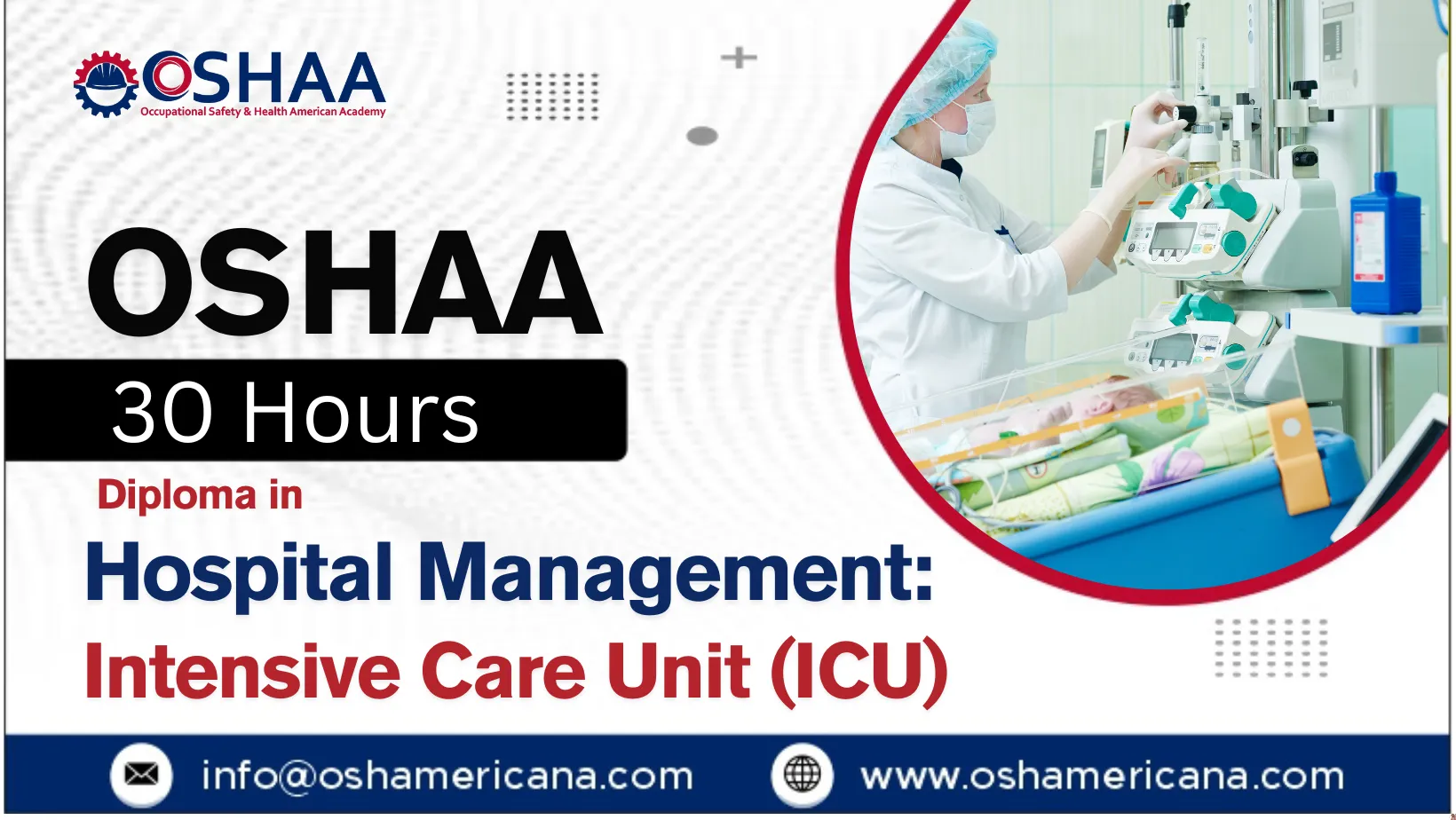The OSHA 30-Hours Diploma in Hospital Management: Intensive Care Unit (ICU) is a specialised programme designed to provide participants with essential skills and knowledge required for effective management of critical care environments. As healthcare systems continue to evolve, the need for well-trained professionals who can oversee ICU operations with precision and compassion has never been greater. This diploma caters specifically to those responsible for managing the complexities of intensive care units, ensuring high standards of patient care and safety.
Participants will gain a comprehensive understanding of ICU management principles, including resource allocation, staff coordination, patient safety protocols, and emergency response procedures. The course is structured to blend theoretical knowledge with practical insights, enabling participants to apply best practices in critical care settings. This balance ensures that participants are well-prepared to address the dynamic challenges of intensive care management.
A key focus of the programme is on developing leadership and decision-making skills that are vital for managing multidisciplinary teams within the ICU. Participants will learn how to foster effective communication among healthcare professionals, promote a culture of safety, and optimise workflow to improve patient outcomes. The course also emphasises regulatory compliance, quality assurance, and risk management tailored to critical care environments.
The OSHA 30-Hours Diploma in Hospital Management: Intensive Care Unit provides participants with a robust framework to excel in one of the most demanding areas of healthcare. It is an essential credential for those committed to improving critical care management and patient outcomes through informed leadership and operational excellence.
OSHAA 30-Hours Diploma in Hospital Management: Intensive Care Unit (ICU)
Study Units
Learning Outcomes
Introduction to ICU Management and Critical Care Principles (3 Hours)
- Understand the fundamental principles of intensive care unit management
- Recognise the critical care environment and its unique operational demands
- Identify key roles and responsibilities within ICU settings
- Describe common challenges faced in managing ICU services
Leadership and Team Coordination in ICU Settings (4 Hours)
- Develop effective leadership skills tailored to ICU environments
- Facilitate teamwork and collaboration among multidisciplinary ICU staff
- Manage conflicts and promote a positive working culture
- Apply decision-making strategies in high-pressure situations
Patient Safety and Quality Assurance in Intensive Care (4 Hours)
- Understand patient safety protocols specific to intensive care units
- Implement quality assurance measures to enhance care standards
- Identify potential risks and errors affecting patient safety
- Promote a culture of continuous improvement in ICU care delivery
Infection Control and Sterilisation Protocols (6 Hours)
- Explain the principles of infection control in critical care settings
- Apply sterilisation procedures to prevent hospital-acquired infections
- Monitor and evaluate infection prevention practices within the ICU
- Ensure compliance with health and safety standards related to infection control
Resource Management and Equipment Maintenance in ICU (3 Hours)
- Manage ICU resources efficiently to support patient care needs
- Oversee the maintenance and proper use of critical care equipment
- Plan for resource allocation during peak demand or emergencies
- Identify cost-effective strategies without compromising quality of care
Emergency Response and Crisis Management in Critical Care (4 Hours)
- Prepare and implement emergency response plans specific to ICU scenarios
- Coordinate crisis management efforts during patient and system emergencies
- Assess risks and manage incidents to minimise harm
- Conduct drills and training to enhance ICU team readiness
Medical Records and Documentation in ICU (3 Hours)
- Maintain accurate and comprehensive patient records in intensive care settings
- Understand legal and ethical requirements for documentation
- Use documentation to support clinical decisions and communication
- Ensure confidentiality and data security in ICU record-keeping
Regulatory Compliance and Risk Management in ICU (3 Hours)
- Interpret key regulations governing ICU operations and patient care
- Identify and assess risks specific to critical care environments
- Develop and implement risk mitigation strategies
- Ensure ICU practices comply with national and international healthcare standards
Course Benefits: OSHA 30-Hours Diploma in Hospital Management: Intensive Care Unit (ICU)
- Provides specialised knowledge essential for effective ICU management and leadership
- Enhances participants’ ability to coordinate multidisciplinary teams in high-pressure environments
- Equips participants with strategies to improve patient safety and ensure quality care in critical settings
- Develops expertise in infection control and sterilisation to reduce hospital-acquired infections
- Strengthens skills in managing ICU resources and maintaining critical equipment
- Prepares participants to respond efficiently to emergencies and crisis situations in the ICU
- Improves competency in accurate medical documentation and compliance with legal standards
- Increases understanding of regulatory frameworks and risk management specific to ICU operations
- Supports career advancement in hospital administration and critical care management
- Offers a recognised qualification aligned with international healthcare management standards
The OSHA 30-Hours Diploma in Hospital Management: Intensive Care Unit (ICU) is designed for participants who seek to develop specialised skills in managing critical care environments. This course is ideal for:
- Healthcare professionals involved in ICU administration and management
- Hospital managers and supervisors overseeing intensive care units
- Nurses and allied health professionals aspiring to leadership roles in critical care
- Quality assurance and patient safety officers within hospital settings
- Individuals responsible for coordinating multidisciplinary healthcare teams
- Professionals aiming to enhance their knowledge of ICU operations, emergency response, and regulatory compliance
This diploma is suitable for both experienced practitioners seeking to formalise their expertise and those new to ICU management aiming to build a strong foundation in intensive care administration.







